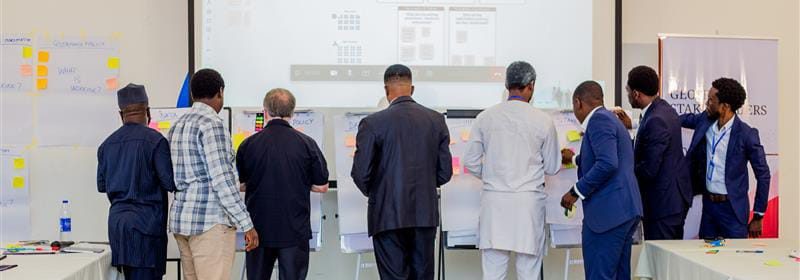The Bill and Melinda Gates Foundation’s Geospatial Insights Support Team (GIST) commissioned Dev-Afrique to enhance the integration of geospatial data into health programming in the Democratic Republic of the Congo (DRC). Challenges hindering the effective use of geospatial data in health programs include inadequate access to reliable information, particularly impacting initiatives like the development of microplans for eradicating polio. This lack of accurate data impedes program planning, resulting in underserved last-mile communities. In response to these challenges, Dev-Afrique initiated the DRC Geospatial Delivery project, and this article highlights the team’s proactive initiatives to optimize health outcomes at the last mile through advancements in geospatial technology.
At the beginning of 2023, Dev-Afrique initiated an end-to-end assessment of the geospatial ecosystem in the DRC. Utilizing the value pipeline model, the assessment involved over 40 organizations, including the DRC’s Ministry of Health. This stakeholder-led approach validated geospatial gaps, prioritized intervention areas, and laid the foundation for a strategic delivery plan. Dev-Afrique played a crucial role in developing this plan, ensuring targeted support for prioritized interventions. Local stakeholder engagement was a cornerstone, with the team actively identifying challenges and securing investments for implementing geospatial solutions.
Dev-Afrique’s work in the DRC bridges the gap between geospatial technology and health. The team empowers stakeholders with the context needed for innovative solutions by articulating the country’s challenges in leveraging geospatial data for health programming. Through workshops, communication facilitation, and donor collaboration, the team drove the development of concept notes, streamlining the execution of impactful projects. This collaborative approach reduces redundancy, ensures efficient resource sharing, and enhances communication among development partners and donors.
The measurable impact of our work is tangible in the transformed landscape of geospatial data utilization for health outcomes in the DRC. Dev-Afrique continues to support the GIST team by maintaining and sustaining stakeholder engagements for the effective implementation of geospatial interventions, developing, and implementing monitoring and evaluation plans for funded geospatial interventions, and establishing platforms for sustained geospatial lessons and use case-sharing.
In conclusion, Dev-Afrique’s collaboration with GIST in the DRC exemplifies the transformative power of geospatial technology in addressing health program challenges. The team’s initiative has laid the groundwork for a healthier and more resilient nation by empowering stakeholders, streamlining interventions, and fostering innovation. As achievements are reflected upon, stakeholders, donors, and partners are called upon to join in building a sustainable future where geospatial advancements continue to drive positive health outcomes in the DRC. Together, a lasting impact can be created, fostering a more equitable healthcare landscape.



Very interesting details you have remarked, appreciate it for putting up.Money from blog